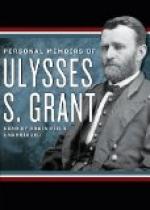On the 6th of December, the following instructions were given:
“CITY POINT, VIRGINIA, December 6, 1864.
“GENERAL: The first object of the expedition under General Weitzel is to close to the enemy the port of Wilmington. If successful in this, the second will be to capture Wilmington itself. There are reasonable grounds to hope for success, if advantage can be taken of the absence of the greater part of the enemy’s forces now looking after Sherman in Georgia. The directions you have given for the numbers and equipment of the expedition are all right, except in the unimportant matter of where they embark and the amount of intrenching tools to be taken. The object of the expedition will be gained by effecting a landing on the main land between Cape Fear River and the Atlantic, north of the north entrance to the river. Should such landing be effected while the enemy still holds Fort Fisher and the batteries guarding the entrance to the river, then the troops should intrench themselves, and, by co-operating with the navy, effect the reduction and capture of those places. These in our hands, the navy could enter the harbor, and the port of Wilmington would be sealed. Should Fort Fisher and the point of land on which it is built fall into the hands of our troops immediately on landing, then it will be worth the attempt to capture Wilmington by a forced march and surprise. If time is consumed in gaining the first object of the expedition, the second will become a matter of after consideration.
“The details for execution are intrusted to you and the officer immediately in command of the troops.
“Should the troops under General Weitzel fail to effect a landing at or near Fort Fisher, they will be returned to the armies operating against Richmond without delay.
“U. S. GRANT, Lieutenant-General.
“MAJOR-GENERAL B. F. BUTLER.”
General Butler commanding the army from which the troops were taken for this enterprise, and the territory within which they were to operate, military courtesy required that all orders and instructions should go through him. They were so sent, but General Weitzel has since officially informed me that he never received the foregoing instructions, nor was he aware of their existence, until he read General Butler’s published official report of the Fort Fisher failure, with my indorsement and papers accompanying it. I had no idea of General Butler’s accompanying the expedition until the evening before it got off from Bermuda Hundred, and then did not dream but that General Weitzel had received all the instructions, and would be in command. I rather formed the idea that General Butler was actuated by a desire to witness the effect of the explosion of the powder-boat. The expedition was detained several days at Hampton Roads, awaiting the loading of the powder-boat.
The importance of getting the Wilmington expedition off without any delay, with or without the powder-boat, had been urged upon General Butler, and he advised to so notify Admiral Porter.




